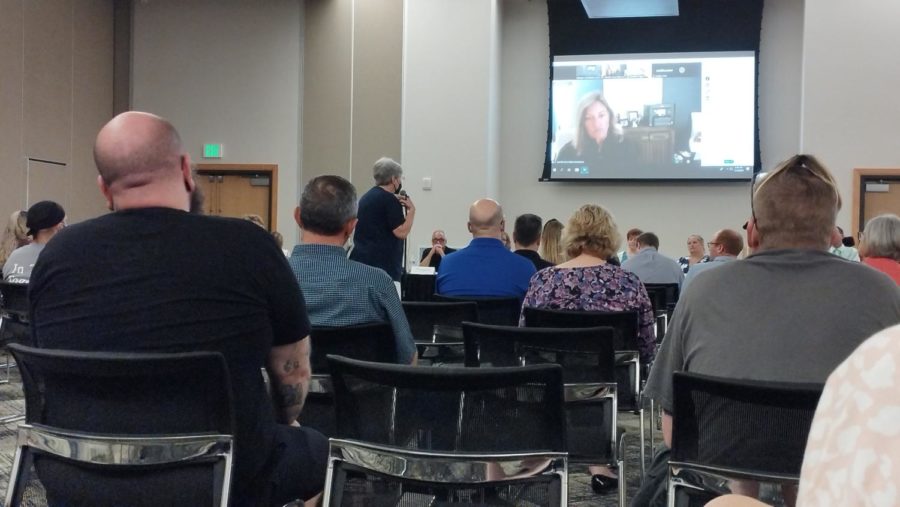Northern Kentucky town hall on medical cannabis held at NKU
The town hall is part of Governor Andy Beshear's action to make medical cannabis accessible in Kentucky
July 23, 2022
A speaker takes the floor at the Medical Cannabis Advisory Committee town hall held in the Student Union July 14.
For over an hour and a half on July 14, the Student Union ballroom resounded with voices and, at times, tears being barely held back. Speakers delivered emotional testimonies about how the lack of legal access to medical marijuana in Kentucky affects their ability to care for themselves and their loved ones. Among their audience was the Team Kentucky Medical Cannabis Advisory Committee, which had chosen Northern Kentucky University as the site for its second town hall.
Kentucky governor Andy Beshear created the Medical Cannabis Advisory Committee via an executive order July 14, as part of an effort to provide relief to Kentuckians suffering from medical conditions such as cancer, epilepsy, multiple sclerosis, chronic pain and post-traumatic stress disorder.
With possession, cultivation and distribution of cannabis heavily criminalized in the state, these Kentuckians have had to rely on pharmaceuticals and opiates, which can have dangerous side effects and cause addiction.
The first speaker at the town hall, a schoolteacher who has a 14-year-old son with intractable epilepsy, shared a list of the side effects of the antiepileptic drugs that her son has taken during his lifetime, all of which are legal in Kentucky.
“Cramps, drowsiness, increased hair growth, nausea, vomiting, near-sightedness, chest pains, lethargy, aggressive behavior, anger, rage, anxiety, chokes, cough, burning,” the list went on. “How many of you would choose those kinds of drugs for your children, if those drugs can commonly cause only a few of what I listed above? This is the only choice we have: the natural choice, one that can not only take away the seizures but take away the terrible side effects, is a choice not afforded to us. It’s an opportunity that my child is being denied.”
According to Governor Beshear’s executive order, 38 states, along with the District of Columbia, Puerto Rico, Guam and the U.S. Virgin Islands, have legalized the use of medical cannabis. Previous efforts to legalize medical cannabis in the Commonwealth have failed in the General Assembly, including bills this year that passed the House of Representatives but did not reach the Senate.
“In the absence of legislation legalizing medical cannabis, I am committed to reviewing what executive action could provide relief to Kentuckians and allow those suffering from chronic pain and other medications to use medical cannabis,” Beshear states in the executive order.
The governor appointed to the committee 17 members with expertise and experience in medical cannabis advocacy, public health, addiction treatment, pharmacy, law enforcement and criminal justice, who are to serve a two-year term. The committee has scheduled town halls in Eastern, Northern, Central and Western Kentucky, where Kentuckians can share their stories within a five-minute time allotment. Those unable to attend in person can leave comments on the committee’s website, which also gives the option to support or oppose medical marijuana.
“We also know that there are people who have a good fight to making this legal. This is not a rally for one position or another. This is an effort that Governor Beshear has undertaken to truly hear the voices of Kentuckians in as direct and unfiltered a way as possible,” said Secretary of the Justice and Public Safety Cabinet and committee co-chair Kerry Harvey at the NKU town hall.
Harvey added that medical marijuana is not a partisan or political issue, and that public polling indicates widespread support among Republicans, Democrats and independents for legalizing medical cannabis.
“In all the town halls, the comments were overwhelmingly in support of medical cannabis. The polling shows that it’s a very popular issue,” said Alex Kreit, director of the Chase Center on Addiction Law and Policy at NKU and member of the committee, adding that the committee has not received many opposing comments.
Even then, Harvey stressed that the voices opposed to medical cannabis need to be heard, considered and expected. Once all of the town halls have wrapped up, the committee will bring feedback from the hearings to Governor Beshear for further consideration.
Kreit noted that because what the governor can do on his own is limited, it would take an active legislature for medical marijuana to be fully legalized.
“There’s a blockade in terms of leadership in one chamber,” Kreit said. “By putting pressure on the Republican leadership in the state legislature, I suspect that it could pass to become law.”
In addition to alleviating pain and reducing opiates abuse, some speakers at the NKU town hall emphasized testing cannabis products for toxins, regulating the clinics and dispensaries that provide cannabis lest they prioritize profits over health concerns, and giving clear guidance when patients take prescribed medications alongside cannabis.
“It takes an incredible amount of courage to share some of the things that you’ve shared with us. It’s absolutely tragic to have to feel like a criminal to treat someone that you love and care for,” said Dr. Nick Kouns, professor of palliative care at Clark Regional Medical Center and committee member. “I am absolutely devastated as a fellow Kentucky citizen to hear your stories, and I promise you that we up here every single day will do everything that we can to make sure your voices are heard, because they are mighty.”

